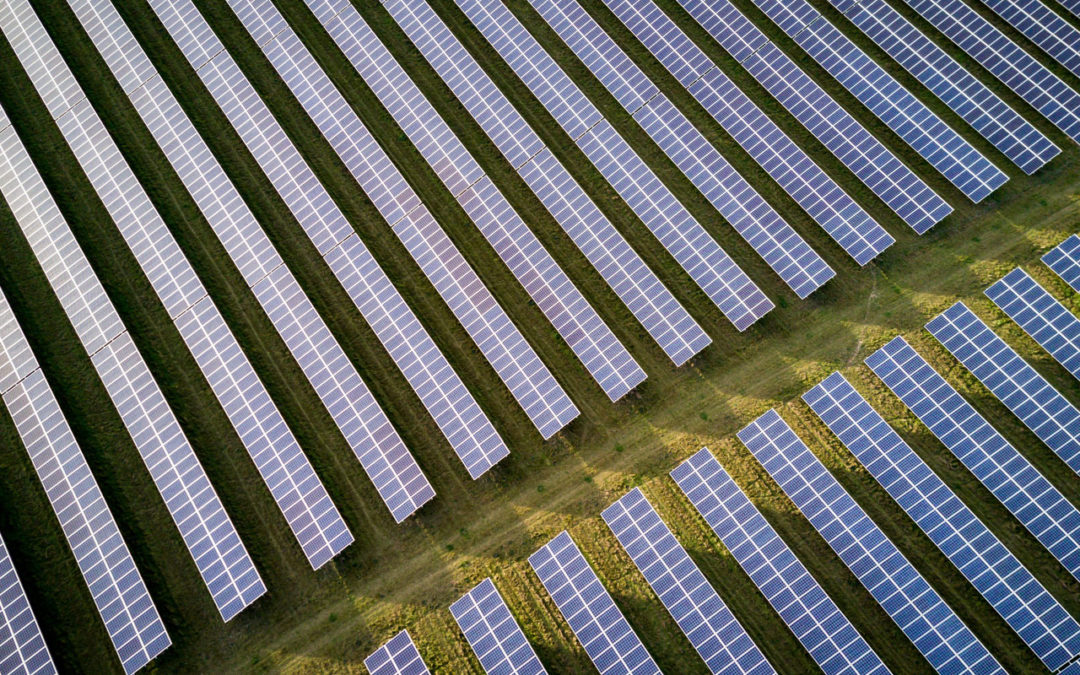
by RENEW Wisconsin | Dec 12, 2024 | Renewables, Solar
The Public Service Commission of Wisconsin (PSC) has approved the Vista Sands solar project at its full size of 1.3 gigawatts. The impact of this decision is difficult to overstate, as this project alone will reduce the carbon emissions of our state’s electric sector by nearly 5 percent. This would mean the removal of 1.7 million short tons of carbon emissions each year by producing enough solar energy to power nearly 250,000 typical Wisconsin homes.
The project also has significant economic benefits and is expected to create about 2,200 jobs during the construction period along with 165 long-term jobs. In all the project is estimated to increase Wisconsin’s long-term economic output by more than $50 million. Local governments within the project area will also benefit from annual utility aid payments of $6.5 million through the course of the project’s life.
RENEW Wisconsin staff and our supporters have advocated for the project since it was proposed by the developer, Doral Renewables, LLC. Our policy team provided expert testimony and analysis in support of the project, which helped the PSC reach their decision to approve it. In their decision on Thursday, December 12, the PSC affirmed the collaborative efforts of the developer as it navigated competing opinions surrounding the project.
The project was at risk of being subjected to half-mile setbacks from the Buena Vista Wildlife Area, which would have significantly reduced its size and put the economics of the project in jeopardy. The request for the setback came out of concern for the greater prairie chicken, a threatened species of bird.
RENEW recognizes the need for balance as we work to meet our decarbonization goals and we agree with the PSC that the Doral provided robust collaboration with the many parties interested in the project and surrounding area. Around 90 percent of the project is located more than half a mile from the wildlife area and the developer has set aside additional habitat for greater prairie chicken populations. The developer also eliminated most of the above-ground transmission in their plan, will install bird diverters on fencing, and will fund the maintenance of existing conservation land.
Now that it’s approved, the project is expected to break ground in the spring of next year with an estimated completion date of December 2028. This project sets a new bar for future solar installations across the state.
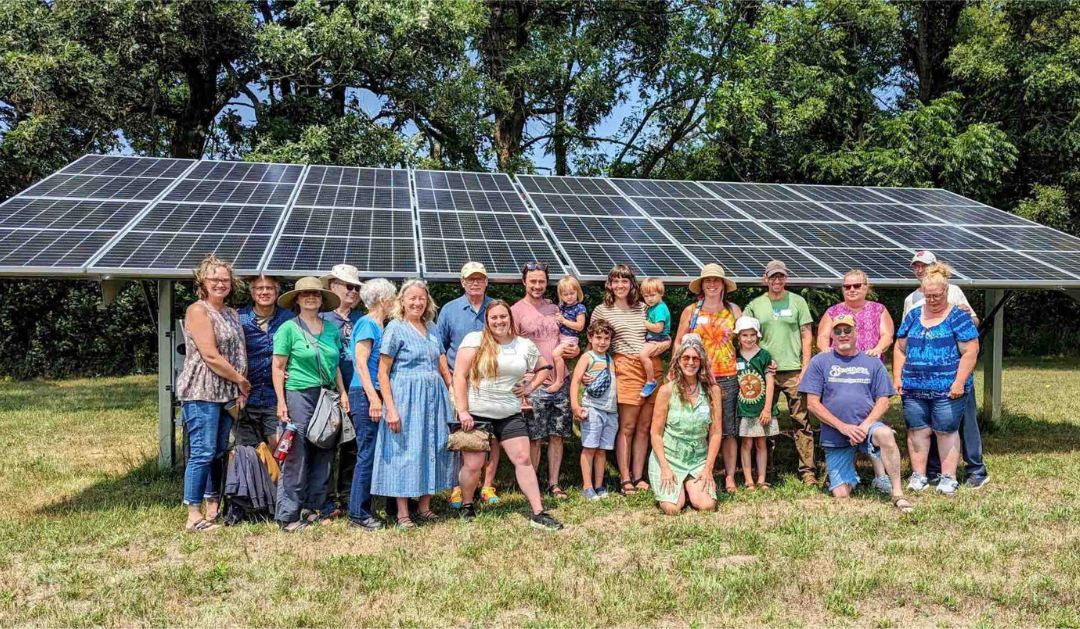
by Tiana Snyder | Nov 21, 2024 | Press Release, RENEW Wisconsin, Solar, Solar for Good
The Solar for Good grant program has awarded over $220,000 in grants and solar panel donations to Wisconsin nonprofit organizations for the Fall 2024 grant round. The 14 nonprofits will install 16 projects for a total of 1,000 kilowatts of solar electricity, leading to more than $2.3 million in renewable energy investments in Wisconsin.
The following organizations have been awarded Fall 2024 Solar for Good grants to install new solar energy
systems:
CAP Services, Inc. – community service, Stevens Point
COULEECAP, Inc. Hillcrest Manor – affordable housing, Ontario
COULEECAP, Inc. REACH – community service, La Crosse
EAGLE School of Madison – education, Fitchburg
Family and Children’s Center – community service, La Crosse
Family Services of Southern Wisconsin and Northern Illinois, Inc. – community service, Beloit
Holy Spirit Parish – house of worship, Stevens Point
Hunger Task Force – community service, West Milwaukee
Ozaukee Food Alliance – community service, Saukville
Recreation and Fitness Resources Center – recreation, Bayfield
Union Congregational United Church of Christ – house of worship, Green Bay
VIA CDC – affordable housing, Milwaukee
West Central Wisconsin Community Action Agency – affordable housing, Hudson
*One organization has asked to remain anonymous.
The grant recipients from the Fall 2024 grant round are a diverse range of organizations, representing affordable housing organizations, schools, and houses of worship. Each facility’s solar project will have a significant impact on their budgets, and will allow them to focus more funds on their missions. Holy Spirit Parish will install 90 panels atop their place of worship in Stevens Point, Family Services of Southern Wisconsin will incorporate 69.6kW of solar to their rooftop, and VIA CDC will install solar systems of 5.33 kilowatts on three housing projects in Milwaukee.
“We are thrilled and deeply grateful for this opportunity through RENEW Wisconsin’s Solar for Good initiative. This support allows us to further our mission with VIA’s Turnkey Program and new construction housing, making a lasting, positive impact on our community through sustainable energy,” said JoAnna Bautch, Executive Director at VIA CDC.
Similarly, the Solar for Good grant will allow Family Services of Southern Wisconsin and Northern Illinois to continue serving families in need by reducing operational costs and allocating more funding to programming.
“This funding has allowed us to equip our Next Steps Family Resilience Center with solar power that will be vital to the long-term sustainability of this programming for unhoused parents with young children while also contributing to a healthier community overall,” said Kelsey M. Hood-Christenson, President and CEO, of Family & Children’s Services of Southern Wisconsin and Northern Illinois.
Since 2017, Solar for Good has awarded grants to over 200 nonprofits across Wisconsin, leading to more than $29.4 million of renewable energy investments in the state. Collectively, Solar for Good grant recipients will go on to install more than 10 megawatts of solar energy.
“We are most grateful to the Couillard Solar Foundation for awarding us half the solar panels we need for installation of our solar array at Holy Spirit Parish in Stevens Point,” said Susan Zach Burns, Solar Project Lead of Holy Spirit Parish. “By reducing our reliance on fossil fuel and turning to solar for a good share of our energy needs, we are joining with you and others to address greenhouse gas emissions and to care for our common home, our beautiful Earth.”
“Our congregation has been energized literally and figuratively by our solar installation and our grant from Solar for Good. Not only will our installation reduce the carbon footprint of our church, it has inspired our members to invest in solar and other climate-friendly initiatives as well,” said Reverand Bridget Flad Daniels, Union Congregational UCC of Green Bay.
Through the assistance from Solar for Good grants, these 16 installations will accelerate Wisconsin’s transition to solar energy, facilitating the expansion of environmental stewardship and energy savings. As Solar for Good looks ahead to future grant rounds, the program will remain committed to supporting nonprofits and houses of worship across the state of Wisconsin by supporting organizations in their efforts to contribute to a positive environmental impact, enhance economic advancement in Wisconsin, and strengthen their ability to aid the communities they serve.
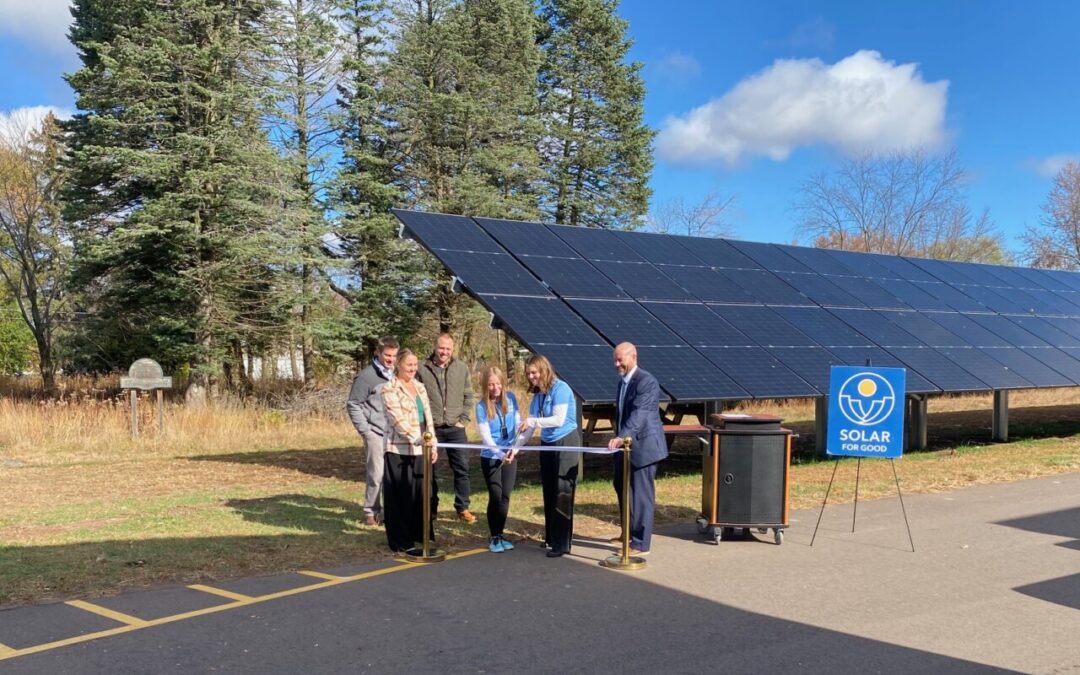
by Tiana Snyder | Nov 11, 2024 | Solar, Solar for Good
On Friday, November 1, Cooperative Education Services Agency 10 (CESA 10) celebrated the completion of its new 124.2-kilowatt solar array during their ribbon-cutting ceremony. Member school districts, Solar Connection, the Green Team, Couillard Solar Foundation, and RENEW Wisconsin joined the event to celebrate this significant milestone. The organization’s commitment to energy efficiency and sustainability in education sets a strong example for school districts and surrounding communities on the benefits of renewable energy and how they can go solar too.
Solar Connection installed a ground-mount solar system consisting of 235 solar panels with 115 panels secured through the Solar for Good grant program. The solar system is set to offset the organization’s electrical consumption by approximately 75%. The successful installation of this project was made possible through dedicated support from the CESA 10 team and support from funding sources. Additionally, the team took advantage of federal and state incentives including the Inflation Reduction Act and Focus on Energy.
Serving 29 school districts and more than 36,000 students, CESA 10 plays a crucial role in offering educational programs and services, ranging from college readiness programs to educational technology and facilities management. Choosing to go solar reflects a key part of their mission in helping schools reduce operational costs so that greater resources can be allocated to enriching the educational experience of students. Its new solar array will not only reduce its own operational costs, but also demonstrate to educators, students, and the broader community the long-term benefits of clean renewable energy.
Going solar is the latest step in CESA 10’s broader sustainability initiatives, but their journey into greater energy efficiency began several years ago. In recent years, they have also undertaken several energy efficiency upgrades including adding LED lighting, improving installation, and replacing roofs of its facilities. Each efficiency upgrade adds up to have a significant positive impact, including lower operating costs and a smaller carbon footprint. With the solar panels recently commissioned, the organization consistently plans to work towards further energy improvements.
Through their efforts, CESA 10 is not only benefiting their own facility but also contributing to a future where solar energy plays a larger role in Wisconsin’s schools. As a leader in showcasing the tools accessible to educators, this project encourages others to consider how they can explore clean energy solutions to enhance their efforts in serving students and having a positive environmental impact.
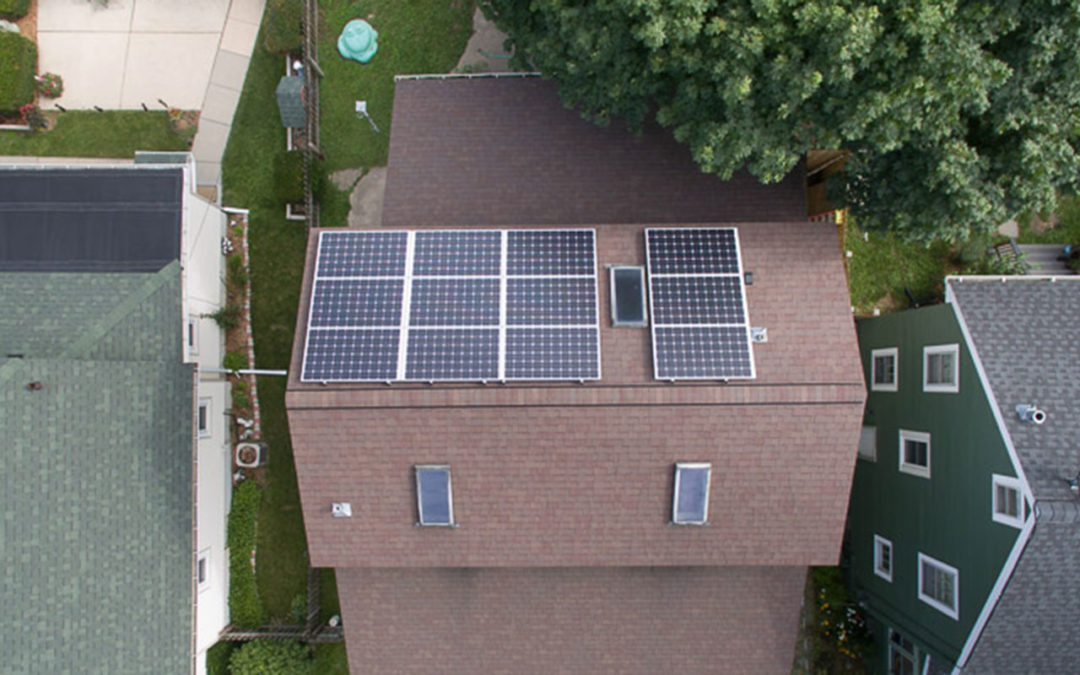
by RENEW Wisconsin | Nov 5, 2024 | Electrification, Policy, Solar
Recently RENEW Wisconsin joined 350 Wisconsin, Clean Wisconsin, Elevate, West Cap, and Powerlines to discuss the proposed changes to electric metering rules. You can watch the webinar and read below to learn more about the subject and how you can get involved.
Installing clean energy technology such as solar panels on multifamily buildings, whether they be apartments, condos, or co-ops often has more hurdles than it does for single-family homes and businesses. Wisconsin’s rules surrounding electric metering of Wisconsin residential buildings, (PSC 113.0803), require each individual unit of a building to have its own electric meters.
Electric metering has a direct impact on installation costs for technologies such as solar arrays, heat pumps, and more. This is mainly due to the amount of wiring required through the building to meet current requirements.
These outdated metering rules can exclude those who live in multifamily buildings from the benefits provided by clean and energy-efficient technology. The Public Service Commission of Wisconsin is actively reviewing the rules in order to update them. We look forward to a favorable change to these rules.
Speakers:
Orrie Walsvik, RENEW Wisconsin
Ciaran Gallagher, Clean Wisconsin
Emily Park, 350 Wisconsin
Heather Allen, Elevate
Mike Noreen, West Cap
And special guest, Charles Hua, Powerlines
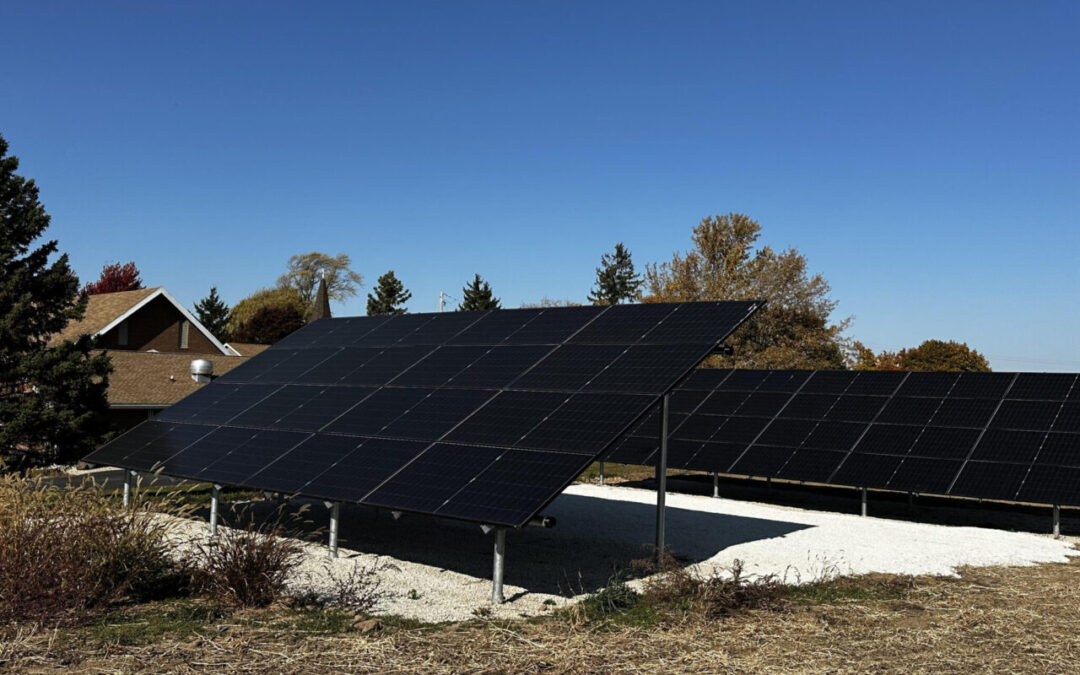
by Tiana Snyder | Oct 26, 2024 | Solar, Solar for Good
On October 20, 2024, Sugar Creek Lutheran Church opened its doors to welcome congregation members, nonprofit leaders, and representatives from other houses of worship to explore its new solar system. The new 19.6-kilowatt solar system is set to exceed the church’s current electrical needs by 14%. These savings will allow Sugar Creek Lutheran Church to continue supporting its congregation, provide scholarships to students pursuing higher education, and provide additional community programming.
The open house featured a tour of its new solar installation, a presentation provided by Solar Project Lead Ervin Schlepp, and materials that outline a step-by-step guide for how other community members and fellow nonprofits can switch to solar energy.
Established in 1849, Sugar Creek Lutheran Church has been a leader and innovator for the Elkhorn community by providing various programs, including a ‘food in backpacks’ meal service program for two schools, and scholarships for students to further their education. The church’s mission “to witness Christ’s love, presence and acceptance with and for all people” is the foundation of the work they do to ensure a positive well-being for the Elkhorn community.
As they approached their 175th anniversary, leadership of the church began to deeply consider how they could further impact the community while also excelling in care for the planet. The congregation’s strong connection to the rural land that the church is situated on drove the church’s desire to explore how Sugar Creek Lutheran Church could enhance its energy efficiency. The solar project team identified incentives including the Inflation Reduction Act 30% tax credit and Focus on Energy, which could help make the transition to solar energy a practical and feasible option. Grant programs further assisted Sugar Creek Lutheran Church in transitioning to solar by greatly reducing the upfront costs of installing the array.
Sugar Creek Lutheran Church contracted a local solar installer company, Adam’s Electric, to install 36 panels. Generous donations from the congregation, in addition to significant grants from the Couillard Solar Foundation and Hammond Climate Solutions Foundation facilitated the development of this project. Through the Solar for Good initiative, Couillard Solar Foundation provided half of the panels needed for the project, and the Moonshot Solar Program funded by Hammond Climate Solutions Foundation contributed $25,000 in grants. By making this project possible through donations from the congregation, Couillard Solar Foundation, and Hammond Climate Solutions Foundation the church will operate on 100% clean energy.
“In our 175th year of life as a congregation and because of the generosity of our congregation we have the opportunity to provide for the electrical needs of Sugar Creek until we celebrate our 200th anniversary,” said Pastor Dick Inglett.
Sugar Creek Lutheran Church, and many other nonprofits across Wisconsin, lead by example within their communities by demonstrating how others can benefit through the power of solar by increasing savings and creating healthier communities. Well over 200 nonprofits across the state serve as ambassadors, encouraging communities to embrace clean and renewable energy through the Solar for Good grant program. Each organization reduces its own costs and inspires local residents to consider the positive impact of solar energy, creating a culture of sustainability and well-being in Wisconsin.
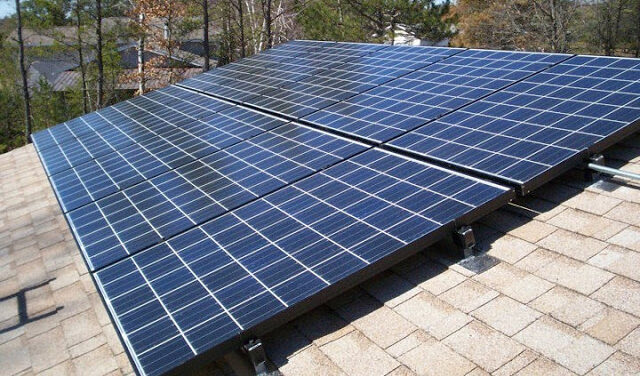
by RENEW Wisconsin | Oct 25, 2024 | Net Metering, Policy, Solar
A Brief History on Recent Net Metering Decisions at the State Level
In 2023, Wisconsin utilities proposed to dramatically change Net Energy Metering (NEM) policies in the areas they provide energy. Such changes would have reduced the financial benefits for consumers with solar arrays at their homes or businesses. These proposals were ultimately rejected by the Public Service Commission of Wisconsin (PSC), however, the Commission agreed to gather more information in a separate statewide investigatory docket. RENEW staff wrote a blog on this topic last November.
This past March, the PSC reopened an existing investigation into parallel generation, also defined as consumer-generated electricity, to direct the future of NEM policy for the state of Wisconsin. Commission staff also issued a memo for comment on issues related to NEM, and requested information and analysis on these issues, including how Wisconsin could approach a potential Value of Solar Study (VOSS). Along with several other organizations, RENEW submitted comments to the PSC with regard to how the PSC should approach a VOSS and other analytical aspects of NEM policy.
Explaining the PSC’s Recent Decision on Net Energy Metering Policy
After gathering comments and information on VOSS, on September 26 Commission staff posted a memo outlining potential next steps, and the Commission quickly discussed and made a couple of important decisions. During the open meeting, the Commission announced that Commission staff have been working with Berkeley Lab and other national lab staff to conduct a nationwide VOSS literature review. The Commission decided to take no action until more information is gathered.
The Commission essentially decided to:
1) Wait until this VOSS literature review is complete
2) Post VOSS literature review for public comment
3) Decide what the next actionable steps are in the investigation
If interested, you can watch the YouTube archive of this meeting, with the NEM investigation discussion starting at the 3:20 mark.
Given the need to gather more information, RENEW believes that this was a good decision by the Commission. It shows that the PSC will use a deliberate process in this investigation and associated analyses, and is not interested in making immediate changes to NEM policy. RENEW staff are keeping an eye out for the results of the VOSS literature review and look forward to commenting and suggesting next steps for the PSC to consider.
Recent PSC Decision on Parallel Generation Buyback Rates
While the Commission further investigates NEM policy, the agency has also been actively revising utility pricing for large solar systems sited by businesses for their own use. The price a utility pays for energy generation beyond a customer’s needs is listed in its parallel generation buyback rates for systems above NEM thresholds.* While the Commission has already revised buyback rates for Wisconsin’s five major investor-owned utilities, it has also begun to consider municipal utility-proposed revisions. RENEW staff wrote a blog regarding Sturgeon Bay Utility’s proposed parallel generation rate revisions this past May.
During an open meeting discussion on October 10, the Commission considered Sturgeon Bay Utilities’ (SBU) proposal to revise its buyback rates. The Commission decided that it needed more information before revising SBU’s buyback rates, and requested that Commission staff reopen the docket to gather more information and analysis through an extended proceeding. The Commission’s decision on SBU’s proposed change could have sweeping impacts across the state as SBU is part of WPPI Energy, which has many municipal electric utility members in Wisconsin. WPPI has stated that it would like to revise all its municipal utilities’ parallel generation buyback rates in line with the Commission’s decision in the SBU case.
Next Steps on NEM and Parallel Generation Buyback Rates
In the coming months, RENEW expects several important Commission decisions in both the ongoing NEM investigation and individual utility parallel generation cases. RENEW staff will follow upcoming Commission developments closely and will directly participate with witness testimony and public comments. You can follow these issues as well, and make your voice heard when public comment opportunities arise. Sign up for RENEW updates and action alerts so that you can provide timely input on these important issues.
*NEM thresholds vary across Wisconsin utilities. WE Energies has a 300-kilowatt (kW) threshold, NSPW and MGE have 100 kW thresholds, WPL and WPS have 20 kW thresholds, and all other Wisconsin utilities regulated by the PSC have a 20-kW threshold.






